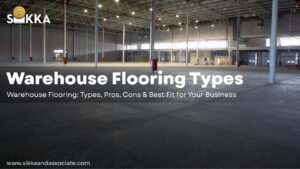What is Commercial Space? Complete Guide with Types, Benefits & Business Impact
When starting or growing a business, one of the most important decisions you’ll make is choosing the right commercial space. It’s more than just a physical location—it’s a critical asset that can influence how your brand is perceived, how efficiently your operations run, and how accessible your business is to customers.
In this guide, we’ll explore what commercial space means, the various types available, key factors to consider before renting, and how to make the best choice for your business.
What is Commercial Space?
A commercial space is any property or building used for business purposes rather than residential living. This can include offices, shops, warehouses, showrooms, hotels, clinics, and more. The primary goal of a commercial space is to support commerce—whether it involves selling products, providing services, or running business operations.
In legal and real estate terms, a commercial space falls under a zoning category that allows it to be used for activities like retail trade, manufacturing, hospitality, healthcare, or professional services.
These spaces are usually leased or rented by business owners rather than purchased outright, giving them flexibility and reducing upfront costs.
Why is Commercial Space Important for Businesses?
The right commercial space plays a key role in the success of your business. Here’s why:
-
Professional Image: A dedicated commercial address enhances your brand’s credibility and trustworthiness.
-
Customer Access: Being in the right location makes it easier for customers to find and visit your business.
-
Operational Efficiency: The right layout and infrastructure can boost productivity and help your team perform better.
-
Compliance: Operating from a legal commercial space ensures you meet local zoning laws and building codes.
-
Brand Perception: A modern, well-maintained space reflects positively on your business and appeals to clients and partners.
Types of Commercial Spaces
Different types of businesses need different kinds of commercial spaces. Below are the most common types:
1. Office Space
Used for administrative or professional work. Office commercial spaces are ideal for IT companies, law firms, consultancies, and startups. They range from small coworking desks to multi-floor corporate buildings.
2. Retail Space
Retail commercial spaces include shops, boutiques, supermarkets, showrooms, and shopping malls. Location, visibility, and footfall are the most important considerations in retail spaces.
3. Industrial/Warehouse Space
These are designed for storage, manufacturing, assembly, or logistics. These commercial spaces often come with large open floor areas, high ceilings, loading bays, and transport access.
4. Restaurant or Food Service Space
Food businesses require commercial space that includes kitchen setups, ventilation, seating, and hygiene-compliant washrooms. Location plays a major role in drawing crowds.
5. Medical and Clinic Space
Used by hospitals, clinics, dental offices, and wellness centers. These commercial spaces require specific infrastructure like medical gas pipelines, waste disposal systems, and patient-friendly design.
6. Hospitality Space
Hotels, resorts, lodges, and guest houses fall into this category. These spaces are designed to offer both comfort and functionality.
7. Mixed-Use Commercial Space
These combine residential and commercial functionalities, allowing people to live and operate a business in the same location. Common in urban developments.
Key Features of a Good Commercial Space
When evaluating a commercial space, consider the following features:
-
Strategic Location: Close to your target audience and easily accessible by public and private transport.
-
Infrastructure: Adequate power supply, internet connectivity, HVAC, plumbing, and structural safety.
-
Parking Facilities: Enough parking space for employees and customers.
-
Security: Secure entrances, surveillance, and fire safety systems.
-
Customization Options: Flexibility to renovate or personalize interiors as per your business needs.
How to Choose the Right Commercial Space
Choosing the right commercial space involves more than just picking a spot and signing a lease. Here’s what to look at:
1. Define Your Business Requirements
Understand the space, layout, and functional requirements specific to your business. Will you need a reception area, private offices, storage, or display space?
2. Set a Realistic Budget
Apart from rent, factor in security deposits, maintenance fees, utility bills, insurance, property taxes, and possible renovation costs.
3. Research the Location
Visit the area at different times of day to assess safety, traffic, noise levels, and footfall. Check proximity to banks, suppliers, competitors, or partner businesses.
4. Check Legal Compliance
Ensure the space is legally allowed for your business activities. Confirm building approvals, fire licenses, occupancy certificates, and zoning permissions.
5. Review Lease Agreements Carefully
Read all terms and conditions in the lease. Pay attention to the lock-in period, rent escalation clause, exit options, sub-letting policies, and who is responsible for maintenance.
6. Inspect the Property Thoroughly
Do a physical inspection to look for signs of damage, water leaks, electrical issues, or pest problems. Take note of any repairs needed and clarify with the landlord before signing.
Advantages of Renting a Commercial Space
Renting a commercial space offers multiple advantages for business owners:
-
Lower Initial Investment: Renting avoids the large upfront cost of purchasing property.
-
Flexibility: You can move or scale as your business grows or changes.
-
Prime Locations: Renting gives access to high-traffic commercial zones without a massive capital expense.
-
Tax Benefits: Rent paid for a commercial space can often be claimed as a business expense.
-
Maintenance Responsibility: Many commercial leases include maintenance by the property owner.
Future Trends in Commercial Spaces
The commercial real estate landscape is evolving. Here are some trends:
-
Flexible Workspaces: Demand for coworking and hybrid offices is rising.
-
Eco-Friendly Buildings: Businesses are looking for commercial space in green-certified buildings.
-
Smart Offices: Integration of tech like access control, energy management, and automation is becoming standard.
-
Smaller Footprints: Many businesses are shifting to compact, efficient layouts to save on costs.
Conclusion
Understanding what commercial space is—and selecting the right one—can shape the success of your business. Whether you’re launching a retail store, opening a clinic, or scaling your startup, the commercial space you choose impacts your operations, branding, and growth potential.
Make informed decisions by defining your needs, exploring available options, and partnering with reliable real estate professionals to find the best commercial space for your goals.






